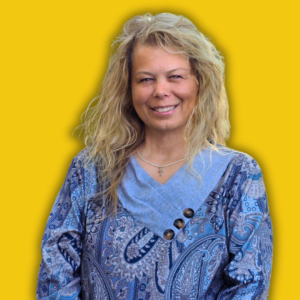 Suzanne Prentice
Suzanne PrenticePrevention Specialist, Up North Prevention
Coordinator and Founder, Live Well Kalkaska Substance Free Coalition
Kalkaska, Michigan
A story in the local paper about a young person losing their life to an overdose deeply moved Suzanne Prentice, igniting her passion for helping families affected by substance use disorder (SUD). One day, overwhelmed with emotion while driving, she tearfully asked for guidance on how she could help other families in need. The answer came in the form of the next song on the radio, “Do Something” by Matthew West. Inspired to act, Suzanne drove to the Third Level Crisis Center and asked how she could help. Through this connection, she was introduced to Catholic Human Services, which provided the support and resources she needed to launch the Kalkaska Coalition. Suzanne’s mission and passion is to help individuals with SUD and their families. She believes in compassion, empathy, and meeting people where they are.
I am the founder and Coordinator of the Live Well Kalkaska Substance Free Coalition and the Prevention Specialist through Catholic Human Services, Up North Prevention. We connect families and individuals to needed education, resources and support.
To help minimize substance misuse, our organization offers free, healthy alternative activities for the community. We partner with the Kalkaska Conservation District to teach families and youth how to enjoy the beautiful natural resources of Northern Michigan through activities like hiking, canoeing, and biking. We also partner with the Lewis School, a local non-profit, to incorporate music and art into our events, encouraging mindfulness and expressing feelings through creative outlets such as drawing and writing. We encourage families, not just youth, to attend these activities to increase family involvement and learn better coping skills. It’s rewarding to see our youth get excited about learning different activities. Watching a student experiencing anxiety relax and enjoy their surroundings proves that nature provides healing.
We work closely with the Kalkaska County Sheriff’s Office to help build healthy relationships between law enforcement and the community. Deputies attend our “Hike and Camp,” allowing participants to interact with law enforcement more personally. The Sheriff’s Office also partners with us to provide “Comeback Sacks” – backpacks filled with personal hygiene products and Naloxone – to individuals with substance use disorders who are being released from incarceration.
We work with the Northern Michigan Opioid Response Consortium (NMORC), a program of the Michigan Center for Rural Health, which regularly attends our monthly coalition meeting and provides valuable support and resources.
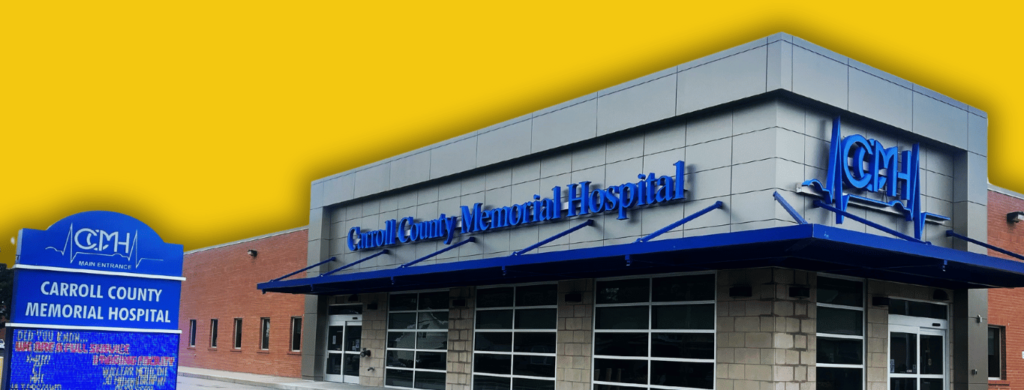 Carroll County Memorial Hospital
Carroll County Memorial Hospital Carroll County Memorial Hospital (CCMH) has served Carroll and nearby counties for nearly 70 years. Built from a hometown dream of bringing healthcare close to home, this Critical Access Hospital has evolved into a leading outpatient diagnostic center, an advanced technology center, and home to numerous physician specialists who provide specialty care. CCMH works with community leaders, including the Carroll County Community Development Corporation, the Kentucky Transportation Cabinet, and the University of Louisville Health, to provide innovative and compassionate care as they continue to be the vital cornerstone of their community.
Two years ago, CCMH recognized a significant challenge within our community: the decline of small hometown pharmacies and difficulties with large retail pharmacies. In response, an outpatient retail pharmacy was opened. It now fills up to 1,400 prescriptions per month, and due to its success, we are adding a drive-thru window and extending hours. What began as a service for our hospital and clinic patients has evolved into a broader community pharmacy, meeting the needs of the entire local population.
Witnessing the transformative impact of our Empowered Living program has been incredibly rewarding. It is fulfilling to see individuals who were once isolated and struggling with behavioral health challenges regain their confidence and sense of purpose. A particularly memorable accomplishment was expanding our wellness transportation service, which started as a small pilot program but grew as we saw the profound difference it made—enabling patients to consistently attend therapy sessions, medical appointments, and community activities. It’s now an integral part of our program.
The “Power of Rural” represents the strength, resilience, and deep sense of community that defines rural areas. It is evident in how people rally to help neighbors, the resourcefulness they show when solutions aren’t readily available, and the commitment to preserving a way of life that values connection, hard work, and a deep respect for the land and each other. It’s this collective spirit that makes rural communities not just survive but thrive, and it’s a powerful force that deserves recognition and support.
Our strong relationship with the State Office of Rural Health is crucial in our ongoing efforts to strengthen healthcare in our rural community. We regularly collaborate with them, attend their training opportunities, and benefit from their support through the Small Hospital Improvement Program (SHIP) grants. We also work with them to advocate for policy changes, often traveling to Washington, DC, to lobby and meet with our state legislative representatives, ensuring the needs and challenges of rural healthcare are heard.
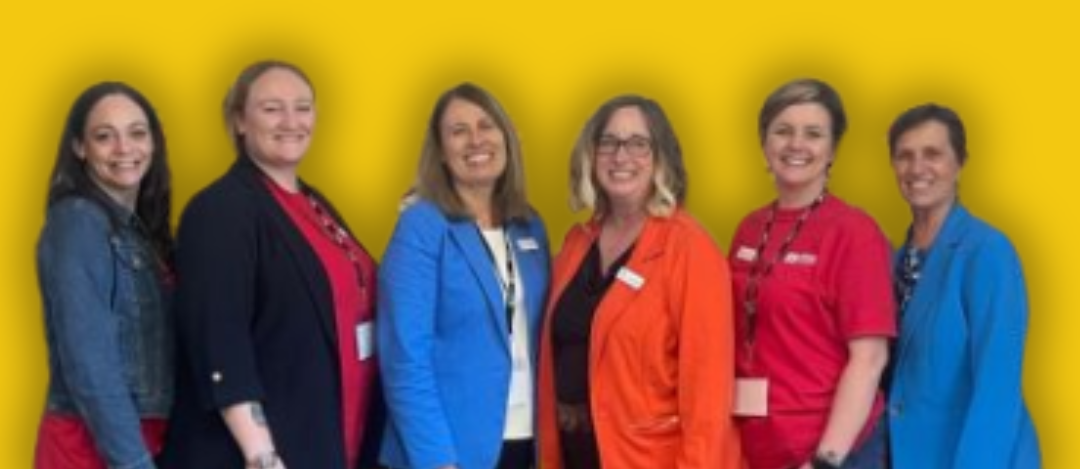 Arkansas Behavioral Health Integration Network
Arkansas Behavioral Health Integration Network The Arkansas Behavioral Health Integration Network (ABHIN) has made remarkable progress in integrating behavioral health into the healthcare continuum in rural Arkansas communities. A standout initiative is the A-Route project, which has significantly increased access to Naloxone in these areas. Additionally, their “While You Wait” podcast, accredited for one free CEU per episode, brings healthcare professionals together to share insights and cover important topics like stigma reduction and maternal mental health. Their extraordinary efforts have not only saved lives but also enriched the well-being of rural Arkansans.
We have been honored to receive three Rural Communities Opioid Response Program grants that have allowed us to build a consortium that is truly making a difference across ten counties in North Arkansas. ABHIN is bringing Behavioral Health Integration (BHI) into rural areas across Arkansas, offering a perfect solution for areas with extremely limited mental and behavioral health resources. BHI places Behavioral Health Specialists in rural primary care settings to support patients with mental and behavioral health needs. Providing this support to rural primary care providers is critical.
We had the opportunity to develop a strategic plan for a suicide postvention network in North Arkansas. While most efforts focus on PREvention, we recognize that POSTvention care is also suicide prevention. We worked with organizations across all sectors – first responders, coroners, behavioral health providers, faith groups, and more – to develop a plan that will allow rural communities to provide timely, comprehensive support to people who have lost someone to suicide. This innovative approach can serve as a model for other rural areas.
We engaged several partners to host the first annual Re-Entry fair in Harrison this year. We engaged social service providers, treatment providers, legal support, and others to provide a one-stop shop that can help people who are re-entering society after incarceration or addiction treatment.
While we may lack many resources, rural communities have powerful and unique resources that can’t be found elsewhere. A shared sense of community history, the ability to come together and support each other when times are hard, close community connections and collaboration, and the innovation required to overcome challenges are some of the strengths that build the power of rural communities.
Our State Office of Rural Health has been instrumental in helping us recruit healthcare providers for several key projects. They provide subject matter expertise that has helped us build responsive programs and have also connected us with potential collaborators. We are thankful for their work and for this meaningful partnership.
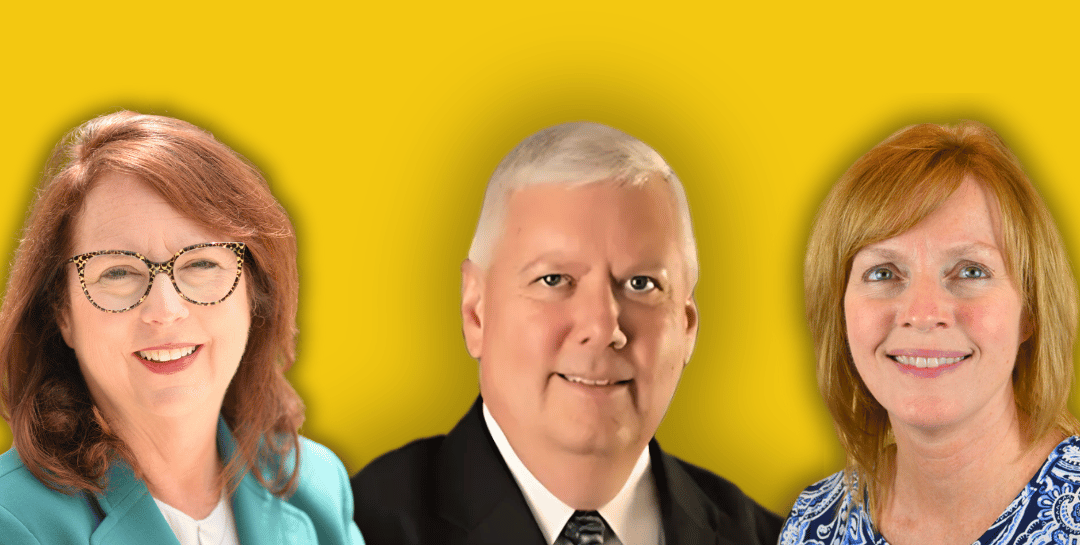 Indiana University Health (Bedford, IN)
Indiana University Health (Bedford, IN)
With its predominantly rural population, Lawrence County, Indiana, has long faced significant challenges in healthcare access and social determinants of health. In 2022, the local healthcare system announced the closure of its Critical Access Hospital in Bedford, posing a serious threat to the community. This closure left only one critical care facility, limited access to essential services like labor and delivery, and raised concerns about the continuity of care for local residents.
In response, three healthcare organizations—Indiana Health Center, Southern Indiana Community Health Care, and IU Health Bedford—came together to address the crisis head-on. Through a coordinated and strategic partnership, these organizations developed a plan to ensure healthcare access for all Lawrence County residents. This collaboration has been widely recognized for its impact, showcasing the power of working together to put patient care above competition and to address healthcare disparities in rural communities.
This partnership stands as a model of how healthcare providers can unite to safeguard essential services, ensuring that rural communities retain access to critical care during challenging times.
The “Power of Rural” reminds us that healthy communities, regardless of location or population density, empower everyone.
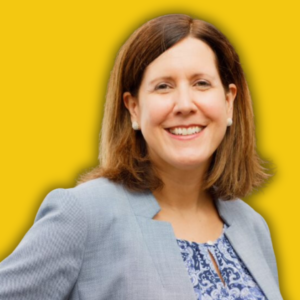 Sara Rich, MPA
Sara Rich, MPA President and Chief Executive Officer
Choptank Community Health System, Inc
Denton, Maryland
Sara Rich has a distinguished record of accomplishment and dedication to community health. Under her leadership, Choptank Community Health System (CCHS), a Federally Qualified Health Center (FQHC) located on Maryland’s Eastern Shore, has significantly expanded its reach. She has achieved notable improvements in patient experience and employee engagement. Her leadership is also evident through active participation in regional health initiatives and advocacy at the state and national levels on behalf of the nation’s community health centers.
I have over 25 years of experience in local, state and national healthcare settings, specifically in roles to improve the health and well-being of children, families and communities. I always wanted a career in which I could make a difference in the lives of others. In rural health, the relationships we have in our communities, with our colleagues and with those we serve inspire us all to make that difference every day.
My most rewarding experiences are our amazing partnerships with non-profits, businesses, school systems, health departments and others. Seeing the impact that can be made when organizations come together, such as during the pandemic, makes this work rewarding. At CCHS, adding and expanding behavioral health services was a moment that I was very proud of – this was and continues to be a huge need for our patients and community.
We recognized that some communities were still unable to access health care at our existing locations easily. CCHS, which has a long history of providing medical services through a robust school-based health program, partnered with the local schools to open our school health centers to the entire community, providing care to all residents and increasing access in these underserved areas. Additionally, we have three mobile health units that provide care at schools, homeless shelters, and other community locations, allowing us to reach people where they are and connect them with vital health services.
To me, the “Power of Rural” is working together with partners to provide access to care for all – finding a way and figuring it out.
The State Office of Rural Health is a wealth of resources that assist us in partnerships, workforce recruitment and retention, and provider loan repayment. Their work enhances the rural healthcare delivery system, and we rely on them to advocate for rural health needs at the state and federal levels.
 Joyce Grayson
Joyce Grayson Director
Rural Health Education and Services, University of Kansas Medical Center
Wichita, Kansas
Strengthening the workforce and cultivating a positive workplace culture in rural Kansas is Joyce Grayson’s professional passion. For the past 20 years, she has been dedicated to enhancing the quality and quantity of healthcare professionals in rural Kansas through her leadership in the KU Medical Center’s Rural Health Education and Services (RHES) programs. Joyce has built strong relationships and led numerous initiatives in collaboration with state partners, healthcare organizations, providers, and students. She has proudly represented Kansas on regional and national stages and has shared her expertise as a consultant to other states seeking to implement similar workforce programs. Her wonderful smile, unwavering dedication and love for Kansans have made a lasting impact on all who have had the joy of meeting her.
As the director of RHES, I helped establish the Kansas Recruitment and Retention Center (KRRC) in collaboration with the Kansas Office of Primary Care and Rural Health. KRRC is a statewide program that provides recruitment, retention, career, and education services. RHES also houses programs such as the Kansas Bridging Plan (a loan forgiveness program), the Kansas Locum Tenens program, and Leadership & Development Training, all designed to meet the needs of our workforce and rural communities. Collectively, we have placed over 680 healthcare providers in rural and underserved areas of Kansas, significantly improving access to care and generating over $5 billion in economic impact for these communities. These placements contribute to our rural communities thriving!
Early in my career, a woman thanked me for helping her community find a new family physician. She shared her concerns and fears during the time they were short a physician. Then, in comparison, she shared her comfort and confidence with having the new physician in the community – having access to care for her and her family impacted their quality of life. That conversation has stuck with me for 20 years because it personalized why the work is important.
Our long-standing partnership with the Kansas Office of Primary Care and Rural Health has been key to our success. They are a trusted and highly valued partner! Together, we promote state and federal workforce programs, increase pipeline activities, create survey tools and reports, and provide technical assistance to rural hospitals and clinics. For example, we conducted employee engagement and satisfaction surveys for rural hospitals and clinics. The feedback revealed a need for on-site education related to organizational culture, employee engagement, and workforce retention. As a result, our Leadership & Development Training Services was developed! This program is tailored to meet the specific needs of each organization, ensuring relevant and effective training.
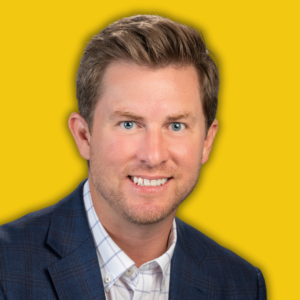 Joseph Marchant
Joseph Marchant President/CEO
Bibb Medical Center
Centreville, Alabama
As the President and CEO of Bibb County Health Care Authority, a not-for-profit community hospital based in Centreville, Alabama, Joseph Marchant dedicates his time to providing outstanding healthcare to Bibb County residents while advocating for equitable healthcare access across Alabama’s rural communities. Under his leadership, Bibb Medical Center (BMC) reopened its Labor and Delivery Unit after a closure of over 16 years, becoming one of the few rural hospitals in Alabama to offer these services. Joseph also recognized the need for senior living in the region and successfully opened a new Senior Living Facility, achieving 100% occupancy. Additionally, he initiated a farmer’s market on the hospital campus, providing fresh, local food to the community, particularly benefiting residents of the Senior Retirement cottages. Whether coaching softball or leading one of the state’s most successful rural healthcare systems, Joseph is committed to enhancing the quality of life in Bibb County.
In a rural West Alabama community devoid of a YMCA or a Boys and Girls Club, we needed to bring opportunities to children in the community and provide a facility that encourages health and wellness for adults and seniors. In 2022, the BMC Wellness Center, a 28,000 sq. ft. fitness and recreational facility, opened its doors and has made a significant impact in the community. From senior citizens regaining their mobility in water aerobics to the new recreational programs introduced to local youth, the Wellness Center has enhanced the quality of life for all generations in the community.
In rural Alabama, accessing healthcare can be challenging for many residents. Although healthcare services are available, transportation often poses a significant barrier, especially for the elderly population. We envisioned eliminating these transportation barriers by providing primary care directly in patients’ homes. BMC at Home was established and now offers primary care services to 300 patients within a 30-mile radius.
There is a significant and ongoing need for healthcare workers across the state, specifically nurses. In 2022, Bibb Medical Center partnered with Shelton State Community College to offer convenient educational opportunities for rural students interested in pursuing a nursing career. This pathway helps eliminate both travel and financial barriers. Since its inception, two cohorts of students have graduated and entered the workforce throughout West Alabama.
I believe everyone wants to make a meaningful impact in what they do. Often, there is more opportunity in rural areas to become an integral part of the community.
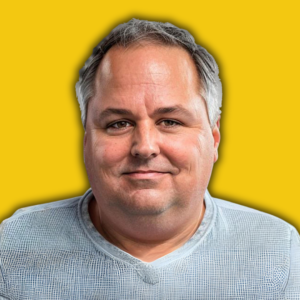 Darin Thomas
Darin Thomas Strategic Project Director
Prisma Health Addiction Medicine Center
Greenville, South Carolina
Darin Thomas, a licensed social worker, has made significant contributions to improving rural behavioral health in South Carolina. His compassion, patience, and genuine care for others distinguish him as a standout in his field. Darin has played a pivotal role in developing statewide behavioral health initiatives and addressing critical gaps in rural care. He also serves as a leader in stigma reduction and behavioral health education, chairing the board for Mental Health America in Greenville County and serving on the board for the SC Community Health Worker Association. Darin’s leadership and dedication have profoundly impacted individuals and communities across the state.
At Prisma Health Addiction Medicine Center, I lead initiatives that support individuals with substance use disorders (SUD) in rural communities. One of my early projects involved establishing a coalition in Oconee County to address opioid-related deaths, reduce stigma, and foster partnerships. I also managed a grant that helped individuals in recovery secure employment, advance in their careers, or pursue education. These experiences led to a strong collaboration with the South Carolina Office of Rural Health (SCORH), which expanded into a broader stigma reduction initiative across multiple rural counties. Through this partnership and with funding from the Rural Communities Opioid Response Program (RCORP), we deliver the University of Rochester Medicine Recovery Center of Excellence’s Community Conversations, a Behavioral Health Simulation, and mobile clinics for Medication for Opioid Use Disorder (MOUD). I believe rural communities are the true experts on their own challenges, and my role is that of a facilitator.
During site visits with our Mobile Clinic for MOUD, I’ve witnessed the remarkable progress that community members seeking treatment can achieve when provided with healthier opportunities. One memorable moment was when a member shared that he had been invited to his parents’ home for Thanksgiving, where he could reconnect with his children after years apart. These milestones are not just significant for the individuals; they also represent meaningful progress for the community.
I proactively engage with local coalitions, key community stakeholders, and individuals in recovery. In response to concerns about transportation challenges, we decided to position our mobile clinics in relatively high-traffic rural areas and operate on a walk-up basis. This model has also proven to be an effective community recruitment tool, as established members often bring new individuals for assessment and treatment.
Our partnership with SCORH is invaluable, particularly when seeking to enhance health outcomes in these communities. They stand as the leader and subject matter expert in engaging rural communities, having established a significant level of trust with rural stakeholders. This trust has been extended to our work as a health system, facilitating our integration into the rural communities we serve.
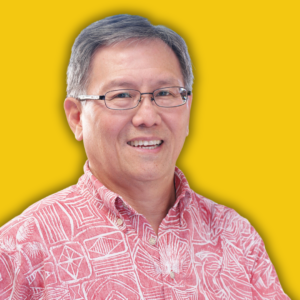 Lance Segawa, FACHE, MPH, NHA
Lance Segawa, FACHE, MPH, NHAChief Executive Officer
Hawaii Health Systems Corporation – Kauai Region
Waimea, Hawaii
Lance Segawa is a Community Star for his extensive work with Hawaii’s Critical Access Hospitals (CAH) and his leadership as CEO of the Hawaii Health Systems Corporation – Kauai Region. In his role, he has expanded services to the community, improved hospital operations, and fostered sustainable leadership. Additionally, Lance provides education on leadership and culture change to other CAHs, earning widespread respect from his staff and peers throughout the CAH network.
I oversee two critical access hospitals, a network of six clinics, and an urgent care facility. One of our hospitals houses the county’s only inpatient behavioral health unit. As a safety net hospital, we serve the most vulnerable populations, provide long-term care services, and recently started a “street medicine” program to deliver primary care to people experiencing homelessness.
My most memorable experience was opening a new 100-bed hospital in a community that previously had no hospital. Building an organization with staff from the local community and witnessing the organization’s spirit was very special.
We converted one of our clinics into an urgent care center to meet the community’s growing demand for urgent care services. With only two urgent care clinics on the island, the wait times were becoming excessive. Within six months of the conversion, we averaged over 45 patient visits per day, with wait times significantly reduced. Most importantly, patient satisfaction has been overwhelmingly positive.
Access to subspecialty care is often challenging in rural areas. In our community, radiologists are a rare commodity. By partnering with another hospital system, we created a group of radiologists servicing the three hospitals in the community. This collaboration has proved to be a cost-effective approach and has also improved the quality of film interpretations overall.
I strongly believe that rural communities deserve comprehensive, premier healthcare services that minimize the need to transfer to larger urban facilities unless clinically necessary. I wanted to be a part of creating a hospital system with this objective.
We have a strong relationship with the State Office of Rural Health. They play an integral role in our development as a high-performing organization by sharing opportunities and providing access to national resources/consultants.
 Courtney Hamilton Griffin
Courtney Hamilton GriffinDirector of Operational Support
Southern Valley Fruit & Vegetable, Inc.
Norman Park, Georgia
Courtney Hamilton Griffin is the Director of Operational Support at Southern Valley Fruit and Vegetables, Inc., a rural, multi-integrated growing, packing, and shipping facility in South Georgia. Southern Valley supports year-round agricultural operations. Recognizing the critical importance of accessible healthcare for migrant and seasonal workers, including the H-2A workers her company employs, Courtney has an intrinsic desire to improve the overall health status of the migrant and seasonal agricultural workers in our rural communities and has become an invaluable advocate for ensuring these workers have access to affordable healthcare services.
Serving as a local business owner in a rural community allows me to be involved in many situations related to rural health. We have over 1,000 farmworkers, and I enjoy advocating for them. For us as a rural business, having healthy farmworkers means a healthy business and more vegetables to the grocery store shelves.
One of my most rewarding experiences has been the Summer Project, where over 1,100 farmworkers, including 300 from our farm, received care in 2024. Bringing medical students to a rural area is super cool. Local churches and businesses contribute by providing meals for the medical students, faculty and staff, while farming businesses ensure their workers receive care and education. We have participated in the Summer Project since 1997, and it is always special to see medical students, local businesses and community members come together to provide essential services to the farmworkers. I look forward to seeing it continue to grow and help many more farmworkers.
During the COVID-19 pandemic, ensuring our workers were vaccinated posed a significant challenge, especially as many couldn’t cross the border without their vaccine cards. However, by working with our local Rural Health Clinic, we addressed the issue efficiently. The clinic staff came onsite to our packing sheds and barracks, providing on-site vaccinations and educating workers about the importance of the vaccine.
Without the “Power of Rural,” we would not have food to eat. Rural communities feed America. We grow cotton, peanuts, corn, fruits, and vegetables. We work hard every day to send food to cities.
Absolutely! Our farming organization benefits from our State Office of Rural Health (SORH) throughout the year! Without our SORH programs and grants, we wouldn’t have our local clinics to treat our amazing farmworkers.
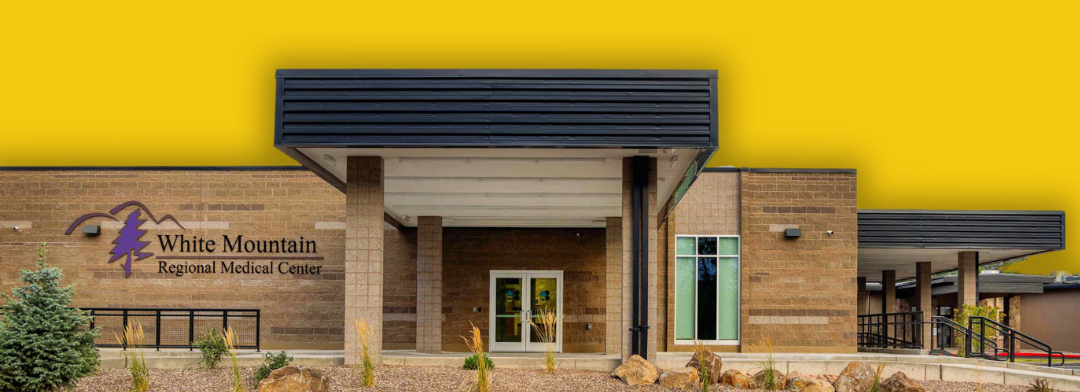 White Mountain Regional Medical Center
White Mountain Regional Medical Center White Mountain Regional Medical Center (WMRMC) has been chosen for its remarkable efforts to enhance emergency medical services in Apache County. Most notably, they completed a renovation project for a state-of-the-art Emergency Department, working with Arizona Senators Mark Kelly and Kyrsten Sinema to obtain a $3 million appropriation through congressionally directed spending. This $11 million project cements WMRMC’s role as a vital fixture in the community, delivering services that reflect their core values of compassion, excellence, and integrity.
The underlying difference WMRMC brings to our community is that we are immersed within it. Our rural setting allows us to provide a level of personalized care to community members that larger facilities often can’t match.
We’ve tackled recruitment and retention challenges by focusing on strategies that shape our organizational culture, such as successful onboarding, clear behavioral standards, and equipping preceptors with evidence-based tools to bring new staff into the community of practice. We have also created employment and growth opportunities for rural residents. Through this innovative approach, we have participated in the growth of many new professionals – from CNAs becoming RNs to registration and environmental service staff transitioning into roles such as RNs, Sleep Technicians and Senior Staff Accountants.
A strong collaboration with the White Mountain Communities Special Health Care District has allowed WMRMC to maintain 24-hour physician coverage and our Trauma and Pediatric designations. This collaboration ensures we continue to provide excellent care for these high-risk populations in our rural community.
The “Power of Rural” means doing more with less. We identify, maximize, and retain the talent and resources that we have, uniting staff through strategic initiatives and shared goals and purposes to provide the best outcomes for the rural communities we serve. It’s about tapping into community strength to make what seems impossible possible.
Our partnership with the Arizona Center for Rural Health is imperative to the survival of our facility. We have partnered with them for trauma resources that support our trauma designation and ultimately improve the care delivered at the bedside for trauma patients in underserved areas. They have been advocates and collaborators for our facility by providing us with resources, education, and, at times, funding that leads to growth within our facility.
 Matthew Cooper, PsyD, MSCP
Matthew Cooper, PsyD, MSCP Training Director
Iowa Psychological Association
West Des Moines, Iowa
Dr. Matthew Cooper is a pivotal figure in Iowa’s mental health landscape, serving as a Licensed Clinical Psychologist and Training Director at the Iowa Psychological Association (IPA). Under his leadership, the predoctoral internship and postdoctoral residency training programs have been enhanced to focus on underserved Iowans. These initiatives aim to bolster Iowa’s mental health resources by retaining psychologists within the state. Since the program’s inception, more than 65 trainees have served over 15,000 Iowans, with nearly 80% of trainees remaining in the state. A collaboration with the National Psychology Training Consortium has also led to the creation of eight new internship positions and a new training region in Iowa.
Iowa has many counties with few or no mental health providers. In my role, I have expanded our psychology training program to provide doctoral psychology students and graduates with the necessary training for licensure while simultaneously providing quality mental health services to underserved Iowans. Recognizing the need for more predoctoral internships and postdoctoral residencies in Iowa, we have partnered with various sites across the state to create diverse training opportunities, helping to expand access to critical mental health services, including specialized services like psychological assessments. The availability of telehealth has further expanded access to mental health treatment options in rural areas.
One of the most rewarding aspects of my work has been seeing the immediate and longstanding changes in the lives of Iowans through expanding mental health coverage. Another accomplishment has been the ability to create a predoctoral training consortium. This critical training year is required by all doctoral training programs in psychology that are accredited by the American Psychological Association (APA). By having this consortium, these partnered sites will be able to train future psychologists, many of whom we hope will end up licensed in Iowa. In turn, these trainees and hopefully future licensed psychologists can move to rural areas to provide services and/or be able to provide services to rural Iowa through alternative mediums like telehealth.
In 2018, we partnered with a training site in Clay County, a rural area with few licensed psychologists. Within two years, the partner site supervised trainees and increased the number of skilled psychology providers in that county by 15%.
Rural communities tend to have an overall belief that they are there to help one another, which encourages resilience and strengthens the overall health of those communities.
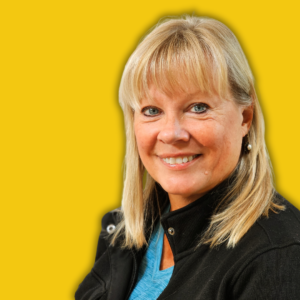 Nancy Murphy, RN
Nancy Murphy, RN Clinical Quality Public Reporting Coordinator
Bridgton and Rumford Hospitals
Central Maine Healthcare
Bridgton, Maine
Nancy Murphy, RN, has been a practicing nurse for over 42 years, spending more than 30 years providing bedside care before transitioning to her current role. She was selected for her unwavering commitment and dedication to quality improvement within her hospital and across all rural hospitals in Maine, where she has instilled confidence in healthcare quality. Nancy has been a beacon of leadership and mentorship within the rural hospital quality group and has significantly contributed to the success of the Maine Flex Network. Additionally, Nancy established the Southern Maine Nurse Honor Guard to honor and recognize those who have devoted their lives to nursing and supporting their peers.
I collaborate with multiple departments through process improvement projects, data collection, and evidence-based practice implementation to improve our quality of care. My organization is involved in many different ventures, such as health equity initiatives and education, food insecurity programs, recruitment efforts, and community needs assessment forums, to ensure that we are meeting the needs of our communities.
Rural health is both challenging and rewarding. It requires doing more with less at times, being creative, and ‘stepping out of the box’ to achieve goals. Collaboration and teamwork are essential. I am extremely proud to have played a role in vaccinating the community during COVID-19. We held clinics at our hospital, and to meet the needs of those who could not come to us, we went to assisted living facilities and even to a local restaurant when workers could not get away. Clinics were open late to reach those coming home after work and on the weekends as well. This could not have been done without the support of administration, coworkers and teamwork.
We held a viewing of Being Mortal by Dr. Atul Gawande at the local movie theater, followed by a panel discussion with local primary care providers about palliative and hospice care. The goal was to open a discussion about care options, offer support, and provide information on available services. The sessions were well attended, and excellent questions were asked.
I find value in being able to work where I live. I am a part of my small community both professionally and personally, and folks know they can stop me in the grocery store and always call on me.
We have collaborated with our State Office of Rural Health for educational opportunities, support on improvement projects, and available resources.
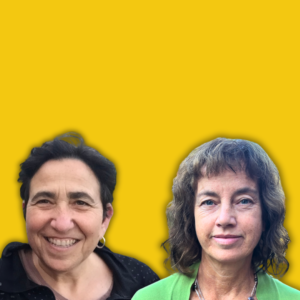 Monica Moran, MSW
Monica Moran, MSW
Manager of Domestic Violence Project, Pioneer Valley Planning Commission
Amy Waldman, MSW
Organizational Consultant, Solo Practitioner
Monica Moran and Amy Waldman have championed the prevention and response to domestic violence in rural Massachusetts for over two decades. Recent federal and state funding shifts threatened support for local coordination of this critical work, prompting them to devise a plan to ensure rural communities receive the necessary assistance to facilitate local domestic violence taskforces. Through diverse funding sources and collaboration with community partners, they established the Massachusetts Rural Network to End Domestic Violence (RNEDV). This community-designed network strengthens domestic violence task forces across rural Massachusetts by connecting them, allowing for mutual support, shared learning, and advocacy for rural needs statewide. Their innovative approach has not only sustained support for the six regions that have historically engaged in this work but has also expanded services to new rural areas.
Our work focuses on engaging rural communities in system change and community-driven solutions to prevent and respond to domestic violence, ensuring that services for adult survivors and their families are accessible in rural communities. The task forces we collaborate with include rural residents in creating and implementing community-based solutions, aligning with the philosophy of ‘nothing about us without us.’ These task forces are comprised of community members, domestic violence survivors, and local agency representatives, who together develop strategies to make their communities safer. For example, outreach campaigns like Hilltown Voices use the voices, words and images of local community members sharing their messages about domestic violence and relationship health. Rural school prevention campaigns, led by teens, use student-made videos and writings to engage their peers.
For years, the Southern Hilltown Domestic Violence Task Force supported monthly meetings of local and state police (at their request) to coordinate efforts and identify high-risk cases. This effort saved at least one life when the State Police had information about a dangerous incident, but only local police knew how to reach the home on a remote dirt road. The effort also improved police response and connected countless survivors to needed services.
During the pandemic, when it was nearly impossible for survivors to leave abusive situations, task forces and stakeholders collaborated to launch A Call for Change, the nation’s first hotline aimed at individuals who want to change their abusive behaviors and learn to be safe in their intimate relationships.
The SORH has been incredible, especially in helping us launch the RNEDV. They have been critical thought partners, have supported us financially, and have helped us make valuable connections with other community stakeholders. We are indebted to their support.
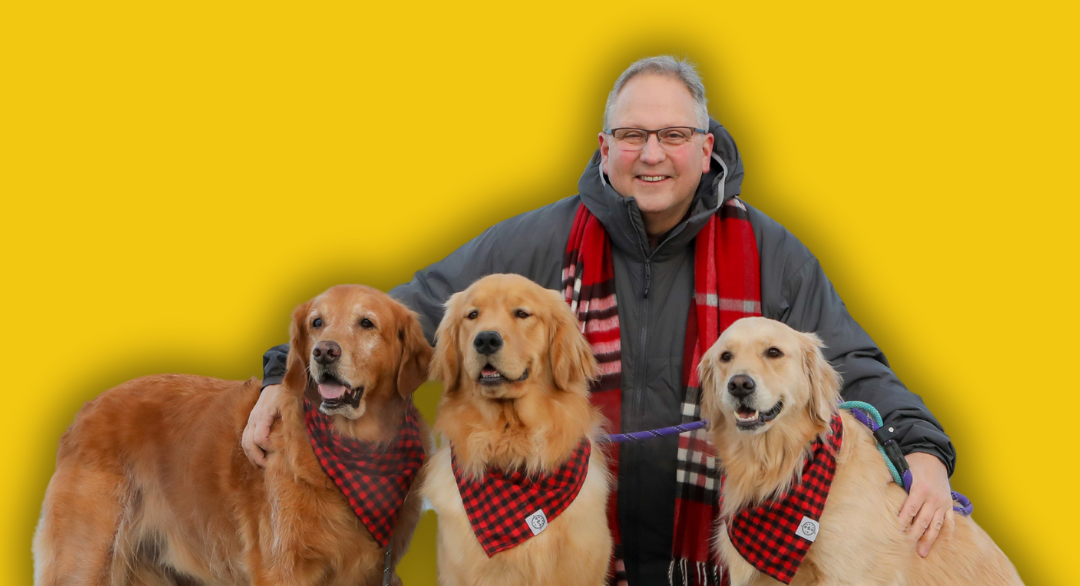 Mark Logsdon
Mark Logsdon Community Health Worker
Logan Health – Whitefish
Columbia Falls, Montana
Mark Logsdon is a dedicated Community Health Worker (CHW) who has made an extraordinary impact on his rural community. His commitment to improving the health and well-being of those around him is truly inspiring. As a key figure in the Food Rx Program, Mark works tirelessly to ensure that community members have access to nutritious food. He understands the vital connection between proper nutrition and mental and behavioral health, going above and beyond to address these interrelated needs. Mark is deeply committed to delivering mental and behavioral health services, particularly in underserved communities. His compassionate approach creates a safe, supportive environment where individuals facing mental health challenges can seek help and receive the care they need. Beyond direct care, Mark advocates for systemic change. His efforts to raise awareness about mental and behavioral health have been instrumental in reducing stigma and improving access to essential resources throughout the community.
One of the most rewarding moments in my work was helping a developmentally challenged individual who was living in dire conditions after the passing of his parents/caretakers. Through numerous letters, emails, and telephone calls, I got him into a much better living situation.
The Food Rx Program, a partnership between Logan Health and Land to Hand, focuses on food-insecure clients with chronic health conditions. Operating through several health clinics in the Flathead Valley, the program helps patients and families break down barriers by providing fruits and vegetables each week at no cost. This has led to improved health outcomes and greater confidence in cooking and storing vegetables while also profoundly impacting the mental and emotional well-being of countless individuals.
I want to be involved with individuals who truly make a difference in areas with very few resources.
To make a difference, to provide needed resources, to be a voice, and to advocate for individuals in rural communities.
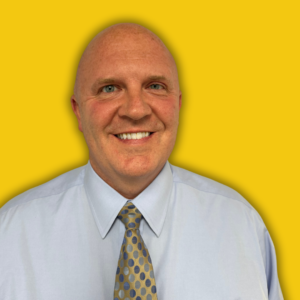 Richard William Katschke, MD
Richard William Katschke, MD Chief Medical Officer
Grover C. Dils Medical Center
Caliente, Nevada
For over two decades, Dr. Richard W. Katschke has been a pillar of his community in Caliente, Nevada—a desert frontier town of 1,330 people. Since 2013, Dr. Katschke has mentored 37 students during their clinical rotations. To put this into perspective, he has spent 37 out of the last 129 months with students, devoting nearly 30% of his total working time to teaching—all on a voluntary basis and without compensation. Dr. Katschke is the type of physician you want setting an example for future healthcare providers. His exemplary bedside manner, patience, and thoughtful guidance during rural rotations have earned him the admiration of students and colleagues alike. One former student shared, “I really enjoyed my time with Dr. Katschke in Caliente. The rapport he has with his patients is some of the best I’ve seen throughout medical school. The entire town puts its trust in him—and rightfully so.”
As the Chief Medical Officer of Grover C. Dils Medical Center, I oversee two rural medical clinics, the hospital, the emergency room, and the long-term care center. In addition to patient care, I supervise four physician assistants and serve as the collaborating physician for a nurse practitioner. I also act as the local EMS medical director and as the physician for the Caliente Youth Center.
I love caring for the people of Lincoln County and playing a role in their medical and social care. My reward mostly comes from expanding and providing medical services to wonderful people who need local access to healthcare. For the past 21 years, we’ve diligently worked to develop and provide a healthcare institution that has the trust and confidence of our rural people.
The idea that I could play a small role in the health and care of the families and community where I grew up has been inspiration enough. From my days in college, I wanted to come back home and provide medical care for people I have known and loved since my youth.
There is great strength in living in rural Nevada among people who are so devoted to community, country, God, and family. There is a strong sense of unity and love in our community. Our community is a place of safety, peace, and protection for our children and families.
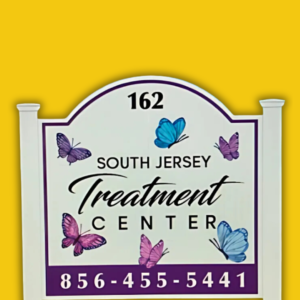 South Jersey Drug Treatment Center
South Jersey Drug Treatment CenterThe South Jersey Drug Treatment Center has been recognized for its unwavering dedication and profound impact on the community. They offer a comprehensive range of addiction and mental health services, helping individuals in rural southern New Jersey on their path to recovery from substance abuse. Their efforts to promote and expand access to these critical services in rural areas are truly inspiring. Whether providing services to communities in need, responding to public health crises, or participating in statewide initiatives, the South Jersey Drug Treatment Center exemplifies the qualities of a true Community Star.
We provide comprehensive care for individuals with Opioid Use Disorders by utilizing medication-assisted treatment (MAT) integrated with a holistic behavioral health approach to promote overall wellness. In our rural community, we address the stigma often associated with addiction treatment, countering the “Not in My Backyard” (NIMBY) mentality. Following the Drug Enforcement Administration’s (DEA) recommendation, we operate outside regular business hours, offering our clients a safe and secure environment that ensures their anonymity. Additionally, our expansion of services was granted through state licensure so that we could provide co-occurring services. This positive impact supports our “No Wrong Door” system of care.
We implemented the co-occurring model of care by having our clients evaluated for mental health issues by a Psychiatric Advanced Practice Registered Nurse (APRN). This created a “one-stop-shop” model where clients can receive comprehensive, integrated care under one roof.
We participated in a community-wide partnership to provide grief support and services in response to the tragic rise of fentanyl overdose deaths in the community. Within our organization, we continue MAT for incarcerated individuals struggling with addiction, ensuring continuity of care and support during their recovery.
The organizational “Power of Rural” MAT services allow credentialed staff members to be employed in their communities without traveling to the big cities.
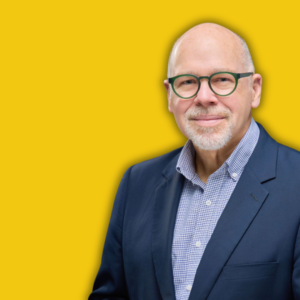 William Massengill
William MassengillFormer CEO
Benson Area Medical Center/Benson Health
Benson, North Carolina
William W. Massengill Jr., a lifelong resident of Johnston County, recently retired as CEO of Benson Health after decades of dedicated community leadership. William was pivotal in bringing together crucial partners during the COVID-19 pandemic, demonstrating his commitment to community well-being. Recognized as Citizen of the Year and having served as Benson’s Mayor for ten years, his leadership has left a lasting impact on both his community and rural health care.
Benson Health, a CMS-designated Rural Health Clinic, has served our community since 1979 and has also been a training ground for future healthcare providers. We partner with MedServe, which helps identify college graduates who desire to become healthcare providers and place them in rural and underserved communities for two years. After coming through Benson Health, these future healthcare providers have a real knowledge of the impact of quality rural healthcare and have the potential to have a long-term impact on the healthcare of rural and underserved people.
One of the most rewarding experiences was our COVID-19 response. We were the first rural health center in the state to administer vaccines, partnering with volunteers, the local health department, and the Campbell University School of Pharmacy to vaccinate hundreds. We also worked with our local hospital, UNC Health Johnston, to provide monoclonal antibodies via a mobile outreach bus and set up a drive-up respiratory clinic that operated for over two years.
Benson has partnered with the NC Farmworker Project to provide a weekly farmworker clinic, offering care for chronic conditions and urgent needs. When the pandemic made transportation unsafe, we secured funding from a partner organization to take the clinic directly to farmworker sites, delivering care in a tent environment with protective measures. This ensured farm workers could receive care safely. We believe that his approach most likely kept farm workers from utilizing an already overrun emergency healthcare system and most likely saved lives.
The NC Office of Rural Health has been a lifeline for Benson Health. They have greatly assisted us in meeting our capital needs so that we could use our operating funds to cover the cost of providing our staff with a living wage and benefits. They are a sounding board where we can talk honestly and without reservation about issues and concerns. When you are a smaller nonprofit, it is critical to have someone who will listen, give advice and advocate for you.
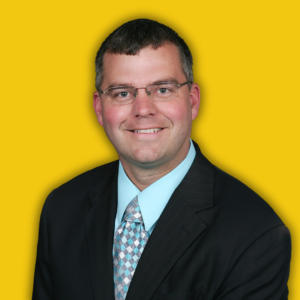 N. Travis Clark, MS
N. Travis Clark, MSVice President of Operations, Valley HealthLuray & Woodstock, Virginia
Travis Clark not only oversees the successful operation of two Critical Access Hospitals in rural Virginia but also makes a lasting impact far beyond the hospital walls. Deeply committed to improving the health and well-being of the place he calls home, Travis actively partners with local community-based organizations, schools and town governments to advance rural health. He is truly a deserving Community Star.
As Vice President of Operations at Valley Health and Administrator of Page Memorial Hospital (PMH) in Luray and Shenandoah Memorial Hospital (SMH) in Woodstock, I manage the operations of these two hospitals located in the heart of Virginia’s beautiful Shenandoah Valley. These hospitals serve two counties covering over 800 square miles, home to approximately 70,000 people. Valley Health also operates a dozen Rural Health Clinics and urgent care centers, providing local access to crucial services such as primary care, cardiology, orthopedics and general surgery. As the region’s largest employer, I prioritize fostering positive relationships with businesses and organizations to create healthier, more vibrant places to live.
During the COVID-19 pandemic, PMH partnered with the Page Alliance for Community Action (PACA) to establish three community gardens on Valley Health campuses throughout the county. These gardens not only provided a safe place for people to connect with others while socially distancing, which was critical for physical and mental health during that time, but they also yielded over 2,000 pounds of vegetables every year. The produce is donated to the Page County Free Clinic and distributed to other individuals living in food deserts. This year, SMH partnered with Community Resources for Education and Wellness (CREW) to establish our fourth garden in Mt. Jackson, Virginia.
To me, the “Power of Rural” is the power of home. I grew up in Page County, went to school here, my family farm is here, and I now live here with my wife and son. It may sound cliché, but we often say we are neighbors caring for neighbors – and our entire team truly embraces that sentiment. It’s not uncommon for me to walk through the hospital and see my former English teacher. That sense of closeness and familiarity drives us to give our very best every day. We want our rural communities to be proud of their local hospitals and feel confident that when they come through our doors, they’ll receive top-quality care from a team of experts who also call this area home.
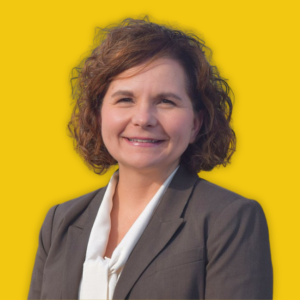 Theresa Sullivan, MBA, FACHE, ACSTH
Theresa Sullivan, MBA, FACHE, ACSTHChief Executive Officer
Samaritan Healthcare
Moses Lake, Washington
Theresa Sullivan’s work is grounded in her belief that rural communities deserve equal access to health care and an exceptional patient experience. Since 2014, she has led Samaritan Healthcare with inspiration, dedication, and service to rural Washington. Under her leadership, Samaritan has expanded medical services and provided state-of-the-art care. Theresa spearheaded the opening and expansion of a second Rural Health Clinic to offer primary and urgent care for the underserved in North Moses Lake. Additionally, they enhanced access in their CareToday walk-in clinics with an app for checking wait times and registering for care. Sullivan’s leadership, vision, and passion for rural health care have had a lasting impact on the region beyond the walls of Samaritan Healthcare.
As CEO, I strive to create passion for the organization’s mission and vision, create a culture of positive employee engagement, and collaborate on innovative solutions. I work with our Board, community members and leaders from other hospitals to form strategic partnerships that improve care and expand medical services in our rural community. Moses Lake is a growing rural area where patients often travel long distances for care. In 2018, we launched a Master Facilities Plan to evaluate current buildings and growth opportunities. With no room to expand, we determined the existing facility wouldn’t meet future demands. In 2023, residents voted in favor of a bond for a new hospital. The new hospital, set to open in 2026, will provide high-quality specialty care, expanded surgical and emergency services, an advanced nursery for at-risk mothers and babies, and improved access to ancillary services.
To meet the growing community demand for care, we implemented a full-scale recruitment and growth campaign focused on bringing more primary specialty services to our patients. During this time, Samaritan Healthcare has recruited more than 35 new physicians and providers across 13 new service lines, including six surgeons, plus additional family medicine providers.
In 2018, we partnered with all six publicly owned healthcare organizations in the region to form the Grand Columbia Health Alliance. This collaboration enables each organization to share resources and technology, providing patients access to state-of-the-art health care without traveling to large cities.
I’ve spent most of my life in rural communities. It seems rural health care found me. I took a hospital position in my community without thinking it would become a lifelong love, but it did. I saw the unique and wonderful connection between a rural community and its hospital – neighbors caring for neighbors. When you strengthen a rural hospital, you truly strengthen the whole community. That connection to purpose and community is my inspiration.
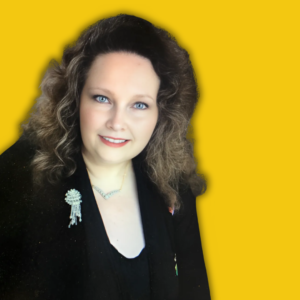 Deborah Curry, JD
Deborah Curry, JDProgram Director for Rural Outreach and Development
Center for Rural Health, Marshall University Joan C. Edwards School of Medicine
Huntington, West Virginia
Deborah Curry is a rural health leader known for her unwavering commitment to advancing rural health care in West Virginia. Over her two-decade tenure at Marshall, she has ignited a passion for health care in thousands of young minds throughout the state. Debbie’s exceptional achievements include leading the Marshall Medical School Pipeline Project, fostering diversity among healthcare providers and medical students, and playing a pivotal role within the Rural Health Association and its Board.
As Outreach Director for the Center for Rural Health at the Marshall University Joan C. Edwards School of Medicine, I work with pathway programs that encourage students to pursue healthcare careers and support retention programs for residents and rural providers. I collaborate with multiple FQHCs, the Higher Education Policy Commission, and other rural health organizations, promoting access to quality care. I’ve served as the WV Rural Health Association President and Director, using my legal background to further our vision. Our team members serve on multiple Boards and committees around rural health issues, fostering collaboration between academic medical centers and rural providers, non-profit agencies, and State Offices of Rural Health.
One of the most rewarding accomplishments was helping to create an FQHC-Look-Alike clinic in an underserved area and watching it grow into a hub for education and research. The National Rural Health Association recognized the clinic as the Rural Health Care Organization of the Year – a proud moment for our team.
We collaborated with a Rural Health Center at another medical school in our state. Medical students from both schools participated in community health awareness events and vaccine initiatives alongside a rural community health center. This joint effort greatly benefited the rural community and highlighted the value of collaboration over competition.
Having lived in a rural community for most of my life, I’ve experienced firsthand the difficulty of accessing quality care. It’s important that my friends and neighbors have access to care that allows them to lead fulfilling lives and maintain employment. Using my skills as a lawyer and my experience in health care and higher education to further rural health has been a wonderful and rewarding career choice.
The “Power of Rural” means harnessing the strength of family, community, and rural allies to come together in innovative ways to improve all of our lives. It means the power of compassion, strength, and perseverance I see daily in my work. Personally, it’s lifting one another up in love and faith to move mountains and accomplish what seems impossible.
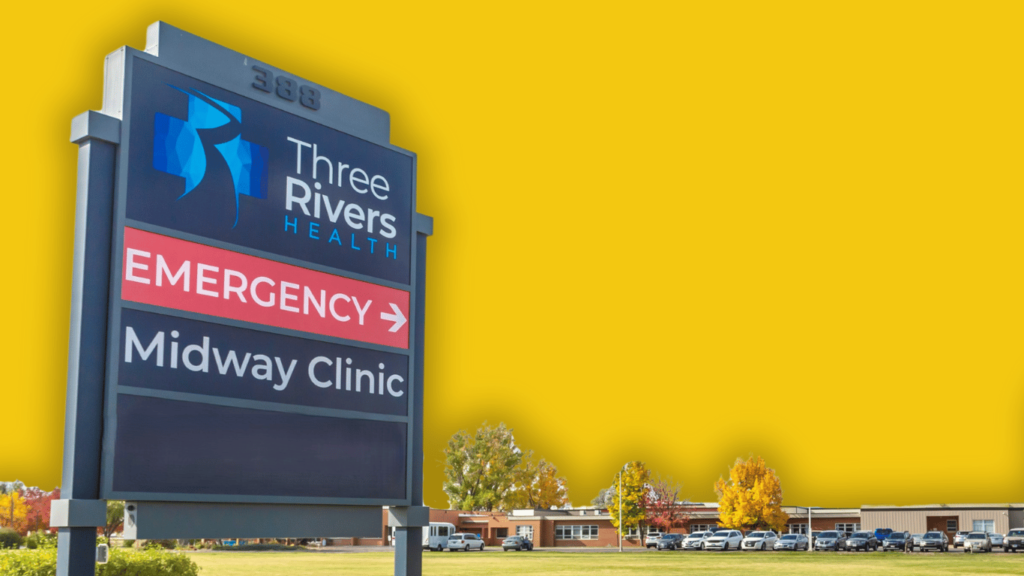 Three Rivers Health
Three Rivers Health Three Rivers Health has experienced substantial changes in recent years, emerging as a stronger healthcare organization through the process. Recently, they hosted the ‘Dare to Lead’ workshop for the Northwest Region of Wyoming, where CEO Joel Jackson opened with a powerful message: ‘We hope you leave today feeling heard and cared for.’ This statement perfectly encapsulates the culture at Three Rivers Health—they take the time to listen and truly care about their community. This was evident during their Community Health Needs Assessment, where they engaged with residents and are now implementing action plans based on their feedback. Over the past year, the organization has also achieved a remarkable financial turnaround by focusing on details, listening, and learning. This progress enabled the first staff pay increase in some time, a testament to their teamwork. With renewed confidence from administrators, the Board, and staff, Three Rivers Health has turned a significant corner and is poised for a bright future.
The last year has been remarkable. In June 2023, we had just six days of cash on hand, and the facility was in danger of closing. Our team and the community worked together to reimagine our needs and diligently focus on patient care. The result was a 24% increase in patient care, a turnover rate of just 1.6%, and employee engagement scores that lead our rural health network counterparts. In short, this is one Critical Access Hospital and Rural Health Clinic that is no longer in danger of closing.
Veterans make up about 10% of our staff, and we contract with the VA to provide services. Our case manager, a veteran herself, has doubled the number of veterans seeking care at our facility. Many travel 70-100 miles for our services, drawn by the high quality of care we offer.
We hired and trained two additional staff over the past year to grow our in-home nursing program to 25% of all outpatient visits required. This has improved diabetic management, reduced hospital readmissions, and significantly boosted patient and employee satisfaction.
When another hospital closed an established primary care practice in Basin, we collaborated with their leadership to employ and re-establish that provider as part of our team. This allowed continuity of care for over 1,600 patients and kept a trusted primary care provider in our community.
My service in the military and my community growing up inspired me. There’s no higher purpose than ensuring rural locations have access to care.
The Wyoming Office of Rural Health was instrumental in our turnaround. They provided technical assistance, allowing us to perform a long-overdue Community Health Needs Assessment. Partnering with them has rapidly improved recruitment, access to care, and training in our underserved rural area.
 Southern New Mexico Promotora Committee
Southern New Mexico Promotora CommitteeThe Southern New Mexico Promotoras Committee (SNMPC) consists of 50 certified Community Health Workers/Promotoras in Dona Ana County who work tirelessly to promote healthcare access and wellness initiatives in their rural community. Their efforts have a profound impact by providing essential health education, services, and resources to underserved families. Their leadership, compassion, and unwavering commitment to making a difference have left a mark on us all, especially in the communities where they live and work.
We advocate for underserved populations and ensure that every individual in our community has the opportunity to live a healthy and fulfilling life, regardless of their background. We connect individuals to essential health services and education, particularly in rural and underserved areas. As a committee, we prioritize continuous education regarding the various resources available in our county to help us effectively guide community members to the right resources. We strive to ensure our services are delivered in a way that is respectful of and sensitive to our community’s cultural and linguistic diversity.
One of our most rewarding experiences was helping a community member struggling with isolation, food insecurity and transportation. Through our mobile clinic, we vaccinated him, provided fresh groceries, and connected him with ongoing food assistance. Seeing his relief and gratitude was incredibly powerful. These moments are what build trust in our community. People know that when they come to us, they’re not just getting a service; they’re receiving compassionate, comprehensive care from someone who truly cares about their well-being. What truly drives us as a committee is our love for our community – we can give back and provide the support we wish we had growing up.
Our success stems from strong partnerships with local organizations, such as local food banks, schools, government agencies, and faith leaders. We’ve organized mobile health units and vaccination events, expanded food distribution, provided health education, and helped families navigate housing assistance and job training resources. These collaborations help us reach people where they feel most comfortable, breaking down barriers to care.
The “Power of Rural” represents resilience, connection, and overcoming obstacles through creativity and unity. In rural areas, people know each other, and that trust forms the foundation of how we care for one another. While rural communities may face unique challenges, we also have unique strengths.
We’ve greatly benefited from our close partnership with the State Office of Rural Health. They’ve provided vital resources, guidance, and connections to programs that help us address challenges. One highlight of this collaboration is our annual National Rural Health Day celebration, where we raise awareness of rural health needs and celebrate our community’s resilience. Together, we’ve built trust, advocated for policy changes, and empowered our communities.
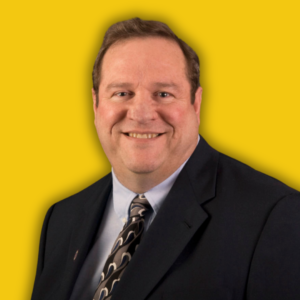 Keith Davis, MD
Keith Davis, MDPhysician
Family Health Services
Twin Falls, Idaho
No one works harder to advance rural health issues than Dr. Keith Davis, both in his professional career as a rural primary care physician and in a volunteer capacity through his service on numerous Boards impacting rural health. Dr. Davis has worked tirelessly throughout his career on behalf of his patients and all Idahoans.
I arrived in Shoshone in 1985 as a National Health Service Corps (NHSC) scholar. I practiced solo family medicine, including non-surgical OB, until 2022, when Family Health Services acquired my Rural Health Clinic (RHC). Following the acquisition, I transitioned to a QA/QI physician role at the Federally Qualified Health Center (FQHC). My initial projects included developing ADA-recognized diabetes education programs and integrating clinical pharmacists at multiple FQHC locations.
Over the course of my career, I served as the County Coroner for 20 years and worked on staff at three area hospitals. I was a founding board member of Interlink Volunteer Caregivers and actively contributed to the American Cancer Society, where I chaired the Idaho Division. I was also a Paul Harris Fellow in the local Rotary Club and an active member of the area Chamber of Commerce. I continue to serve as the Medical Director of the county-operated EMS service. Starting in 1989, I worked with second-year medical students from the University of Washington in their R/UOP program and precepted students from the Idaho State University Physician Assistant Program.
In 2014, I was named the American Academy of Family Physicians (AAFP) Family Physician of the Year – a great honor. In 2023, at the groundbreaking of the new FQHC building in my town, it was a surprise announcement that the new clinic would be named after me!
Several years ago, with state and Federal grant funds, I led my community in a new Community Health Emergency Medical Services (CHEMS) program. We linked ambulance care with the primary care providers for the patients served. We had excellent outcomes, including decreased ER visits and hospitalizations.
I grew up in the small town of Tangent, Oregon—population 300. Shoshone, Idaho, had 1300 people when I moved here in 1985- over four times larger than Tangent! The physician who had served Shoshone and Lincoln County was retiring, and I was looking for a rural site for my NHSC repayment.
Many years ago, the Idaho Office of Rural Health sent me to the annual meeting of the Colorado Office of Rural Health. I was impressed with what Colorado was doing and brought best practices to Idaho.
 Nakeitra Burse
Nakeitra BurseExecutive Director
Six Dimensions
Madison, Mississipi
Dr. Nakeitra Burse is committed to improving health outcomes in rural communities. She is the Founder of Six Dimensions, a small non-profit focused on improving maternal health outcomes. She is also the Executive Producer of the short documentary Laboring with Hope. Dr. Burse spearheads several programs focused on healthcare access, reducing health disparities, and promoting health equity. Her efforts have significantly impacted public health, particularly for underserved populations. She is a true community star.
Six Dimensions’ mission is to enhance Black maternal health outcomes through research, training, outreach, and advocacy. Though we are intimately involved in community outreach and activities directly impacting families, our bigger mission is to create change within systems and communities. Therefore, much of our work is connected to ensuring that those who touch, support, and serve Black/African American women do so in a patient-focused, culturally tailored, and respectful manner. Outreach and advocacy encompass much of our work, allowing us to stay connected with the community’s needs. Additionally, we advocate for policies proven to improve maternal health outcomes, namely Medicaid Expansion.
The most rewarding moments are receiving calls about how our information and resources helped families make decisions and navigate complex health and social services systems.
In 2019, we produced a short documentary, Laboring with Hope, not only as a response to the Black maternal health crisis but also as a result of desiring to amplify the voices and stories of Black women. This film has been shown not only across the state of Mississippi but also across the country. The local outcome has been the most valuable impact, in my opinion. Showing this film in small communities across Mississippi helped create an opportunity for dialogue about the real ways that women experience racism within healthcare settings and increased awareness of how systemic racism creates challenges with navigating systems of care.
Our organization closely partners with Magnolia Medical Foundation to provide direct services that support families during pregnancy, postpartum, and parenting. This partnership has expanded access to doulas, social services, case management, and mental health support. Magnolia Medical also provides essential items such as diapers, wipes, feminine products, water, food, and baby supplies to families in need. What began as a very small-scale project serving only ten women at a time has now blossomed into a full-service program supporting hundreds of families.
The “Power of Rural” means the power of community. Living in rural communities often means organizations and community members must be innovative and resourceful to address long-term and emerging issues.
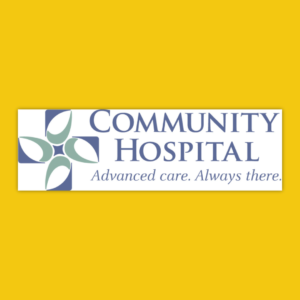 Community Hospital
Community Hospital Community Hospital, a Critical Access Hospital in Southwest Nebraska, truly exemplifies what it means to be a Community Star. The program engages the entire community and takes a comprehensive approach to addressing its diverse needs.
In recent years, our focus has been on population health. We’ve been actively involved in community efforts to increase exercise and develop local amenities. Additionally, we are engaged in local housing and building efforts. Like other rural areas, we face workforce challenges, so we are working diligently to introduce the workforce of the future to healthcare careers.
Our community is facing demographic changes, particularly a decline in working-age residents, which will significantly impact us. Despite this, our organization has been very successful in starting several service lines, and we continue to develop strategic goals and plans to address the workforce challenges ahead.
Radiation Oncology is a prime example of how our organization addressed a significant challenge within our rural community. In response to recurring concerns about long travel distances, highlighted in our Community Health Needs Assessments and patient feedback, we explored potential solutions. In 2014, we opened a Radiation Oncology service line in McCook. Over the past ten years, this service has consistently received positive patient feedback, with many expressing gratitude for having such essential care close to home.
One example of a successful collaboration our organization has been part of is the introduction of the Baldrige Communities of Excellence Framework, focusing on population health. The community has embraced this initiative, and after six years, we have achieved several significant milestones. A new pool has been constructed, and community baseball and softball fields are in progress, with a bond already passed, the YMCA has met a $16 million goal in less than a year. Additionally, a new housing development is underway, and a second disc golf course is being planned and we have an upcoming $43 million school bond coming to vote in November. The community is highly engaged, with members consistently attending meetings, driven by the momentum and excitement surrounding these positive changes.
Yes, the State Office of Rural Health has been incredibly helpful to our organization, providing consistent communication and assistance.
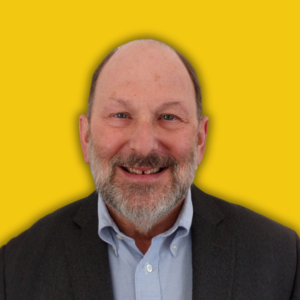 Mark Schoenbaum
Mark SchoenbaumRetired Director
Office of Rural Health and Primary Care, Minnesota Department of Health
Richfield, Minnesota
The Community Star award is just one of many recognitions illuminating the breadth of Mark Schoenbaum’s legacy in improving rural health in Minnesota and nationwide. For over 22 years as Director of the Minnesota Office of Rural Health and Primary Care, he advocated for policies that are now embedded in state government and continue to enjoy bipartisan support. One notable example is the state’s ever-expanding Loan Forgiveness Programs, which have proven to be top-tier return-on-investment efforts in recruiting and retaining primary care providers in rural Minnesota. Mark was also the leader in state government behind the development of the dental therapist profession, and he has since become a trusted national expert and advocate for the field. Mark excelled at fostering collaboration among stakeholders and shepherding competing agendas to consensus. His skills and wisdom were highly sought by the state legislature and his colleagues nationwide. For 13 years, he invested in the next generation of rural health leaders as an adjunct faculty member in Health Policy at the University of Minnesota Crookston. Even in retirement, Mark continues to share his expertise as a consultant on health workforce issues.
Like every State Office of Rural Health, the Minnesota Office of Rural Health and Primary Care contributes to rural communities as a source of funding, hands-on expertise, and a trusted connector and source of information.
There is an underutilized cohort of immigrant and refugee physicians across the country who are ready, willing, and able to go to work to help address the rural physician shortage. However, they are blocked from practicing by hidebound education and licensing practices, leaving many underemployed. Minnesota created a state program to help some immigrant and refugee physicians begin to practice.
The 50 State Offices of Rural Health collaborate nationally through the National Organization of State Offices of Rural Health (NOSORH). As a representative of my State Office of Rural Health, I’ve been fortunate to be part of NOSORH’s ongoing accomplishments to improve rural health by making laws and regulations more practical, educating national decision-makers and bringing more funding to rural communities.
Working in rural health was an opportunity to put my values to work, and I jumped at the chance.
The “Power of Rural” and National Rural Health Day provide great opportunities to celebrate the hard work taking place at the local, state, and national levels and to remind ourselves of the Margaret Mead quote: “Never doubt that a small group of thoughtful, committed individuals can change the world. In fact, it’s the only thing that ever has.”

Sunshine Community Health Center is leading the transformation of community support by implementing meaningful social determinants of health screening that results in real connections to resources for patients and families in need (food, transportation, tobacco cessation, clothing, childcare, housing, water) and is making noticeable improvements in health outcomes.
Sunshine Community Health Center (SCHC) makes a difference in rural health by defining and overcoming the barriers to health in its rural communities. SCHC has a dedicated team that goes above and beyond best practices to serve its rural communities efficiently. SCHC provides comprehensive services that address all social determinants of health and engages with the community through several modalities, such as outreach, palliative care assistance, and community partnerships.
SCHC prides itself on developing innovative pilot programs that aim to reduce the burden on the healthcare professionals who do the work and the burden on patients who have challenges accessing our clinic’s services. Building partnerships and developing collaborations with our local resources is ideal for providing whole-person care. Many non-profit organizations in the Northern Valley, such as the Upper Susitna Food Pantry, Sunshine Transit, Denali Education Center, and Upper Susitna Senior Center, build service opportunities that aim to bridge gaps in community members’ needs. SCHC utilizes this network to help complete unmet social needs affecting a person’s ability to be healthy.
SCHC has built a pilot program for an e-referral system in partnership with Connect Mat-Su, a Mat-Su Health Foundation organization specializing in resource allocation. The aim of this project and our collaboration is to meet the social needs of the patients while decreasing the staff burden in providing the highest quality of care with limited resources. Our program workflow is framed around prioritizing Social Determinants of Health and health-related social needs with every patient and focusing on high-risk, chronically ill community members.
The Power of Rural means leveraging power for the unique characteristics each rural area embodies. Rural areas have an advantage in that they can voice and share a story that hasn’t been heard—a story as unique as the dynamic and culture of the people who live in that rural area. That is the Power of Rural.
The Alaska State Office of Rural Health has been instrumental in helping us understand better ways to approach population health concerns. The Office has a small staff, yet when asked for technical assistance, the staff have always met the challenge with evidence-based, qualified direction to help navigate program endeavors to meet the needs of our Northern Valley communities with willingness and availability.
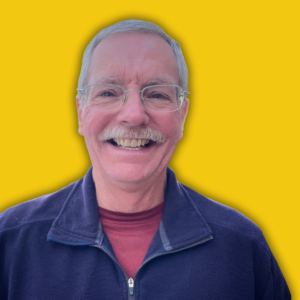 Robert Downs
Robert DownsPhysician Assistant, Assistant Medical Director
Lake City Area Medical Center
Lake City, Colorado
Robert Downs served as a Physician Assistant and the Assistant Medical Director for Lake City Rural Health Clinic in Hinsdale County. Under his leadership, the clinic has enhanced its services by engaging in various programs and activities. Robert has been deeply involved in advocacy, participating in the Rural Colorado Primary Care Leaders Program to understand healthcare policy better and help others in his community understand the importance of advocacy. He has advocated for state-level workforce policies for advanced practice providers and has testified multiple times for PA workforce bills. Although Robert recently retired, he remains committed to his community and continues to work part-time.
Lake City Area Medical Center is the only healthcare facility in our rural community, situated 55 miles from the nearest Critical Access Hospital. Hinsdale County is one of the most remote counties in the lower 48 states, with a year-round population of 850 that swells to 2,000-4000 during vacation season. The most rewarding aspect of my time at the medical center has been caring for the people who live here year-round and keep our county running, including our town and county employees, teachers and students, service workers, and other business leaders.
During the COVID-19 pandemic, we approached care for our community in a very fluid situation. With limited resources, we needed to devise a strategy to manage and care for our population effectively. Given the possibility of being unable to transport patients out of our community, this required close coordination with other county emergency service organizations.
I spent 17 years in EMS, mainly as a paramedic and flight paramedic. I decided I wanted to have a greater impact on patient health and went to PA school. I then worked in Emergency Medicine at a Level 1 trauma center, honing my skills with the intent to spend the last ten years of my career in a rural setting. I always wanted to work in a smaller community where I was ‘taking care of my neighbors.’ Now semi-retired, I devote my time to medical mission work, including two recent trips to Ukraine, and I continue to volunteer as a Paramedic with Hinsdale County EMS.
To me, the “Power of Rural” means keeping our county functioning economically as well as in good health. The small rural clinic should be the leader in setting high standards of physical and behavioral health.
The Colorado Rural Health Center has provided significant support through advocacy and technical assistance. They’ve also provided invaluable advice on staff recruitment.
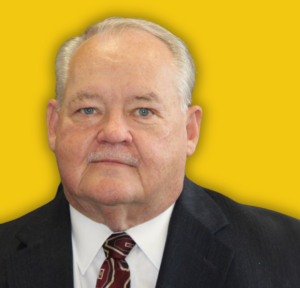 Brian Olson
Brian OlsonChief Executive Officer
La Red Health Center, Inc.
Georgetown, Delaware
For over 25 years, Brian Olson has led the development and expansion of La Red Health Center (LRHC), the sole Federally Qualified Health Center (FQHC) serving rural Sussex County, Delaware. LRHC began as a part-time phone linkage program. Under Brian’s leadership, the organization has grown to include three FQHC service sites offering a full spectrum of care, including OB/GYN, integrated behavioral health and medication-assisted treatment, onsite dental care, and a mobile health unit. Brian has been a humble, steady leader in safeguarding the success and sustainability of LRHC. He has maintained decades-long effective relationships with community-based organizations, the health services industry, and local and state government agencies through many seasons of change. As Brian prepares to retire at the end of the year, there is no better time to acknowledge his impact on Delaware’s rural health system than during National Rural Health Day!
Our organization offers primary, oral, and behavioral health services at all three of our facilities. In addition, we provide a wide array of enabling, enrollment, outreach, educational, and transportation services. We have created a ‘one-stop shopping model’ that benefits our patients and providers by having access to this integrated delivery model.
Public transportation in our county is limited. Consequently, early on in our development, we committed to purchasing transportation vans to ensure that our patients have access to services provided at our facilities and specialty services throughout our state and as far away as Philadelphia. By doing so, we have mitigated the unnecessary use of hospital emergency rooms and lessened the burden of hospital admissions.
I was successful in convincing our state government to relocate the Women, Infants, and Children (WIC) program into our main facility to better meet the needs of our patients and alleviate a separate transportation need for them.
To me, the ‘Power of Rural’ connotes the concept of ‘locally grown.’ To really understand a community’s unique culture and needs, you must live in and be rooted in that community.
Yes! I also serve as the Board Chair of the Delaware Rural Health Initiative (DRHI), a collaborative vehicle for addressing shared regional health concerns in a more coordinated manner. In both this role and my day-to-day role, I have worked closely with our State Office over the years.
 Donna Kahm, SPHR
Donna Kahm, SPHRPresident & CEO
Southern Tier Health Care System, Inc.
Olean, New York
Donna Kahm leads Southern Tier Health Care System (STHCS) in assessing community needs and developing programs that increase access to care and essential services, including emergency medical services, creating safe environments, substance abuse prevention, caregiver support, health insurance navigation, and economic development. She fosters partnerships to reduce duplication and increase efficiencies, maximizing resources. Deeply committed to her community, Donna is a compassionate, tireless leader whose efforts have made a remarkable impact. She truly exemplifies community service and is a true Community Star.
Since 2007, I’ve served as President and CEO of STHCS, overseeing a rural health network that serves Allegany, Cattaraugus, and Chautauqua counties in southwestern New York. My work focuses on improving access to health care and enhancing quality through strategic partnerships and innovative programs. I’m deeply committed to making a meaningful impact on the well-being of our residents.
One of the most rewarding moments was implementing the Cribs for Kids program. Since 2016, we’ve distributed 724 cribs and trained 847 parents and caregivers in safe sleep practices. To date, no infants in our program have succumbed to an unsafe sleep death. Moments like these illustrate the tangible difference we can make, especially in resource-limited rural areas.
In 2013, we launched the transformative Regional Paramedic Program using distance learning technology to provide advanced training for rural EMS providers. Funded by the USDA and the Appalachian Regional Commission, the program established a network with over nine satellite sites equipped with high-fidelity training materials, helping hundreds of EMS providers enhance their skills without long-distance travel.
One of our most successful collaborations is our work with community agencies to combat the opioid crisis, including the EMS “Leave Behind” Narcan program. Partnering with EMS teams, we provide Narcan kits and training to at-risk individuals. Our strong relationships with jails ensure that released individuals receive Narcan kits and information on accessing treatment services. These efforts have saved lives and strengthened our community’s response to the opioid crisis.
The “Power of Rural” represents the resilience, strength, and ingenuity inherent in rural communities. It acknowledges the profound impact that focused, community-driven efforts can have on improving health outcomes. The “Power of Rural” is the driving force behind our work and serves as the foundation for our ongoing commitment to enhancing healthcare access and quality in these communities.
We have a close relationship with the New York State Office of Rural Health. This collaboration has significantly strengthened our ability to address rural challenges and has been a key factor in our organization’s success.
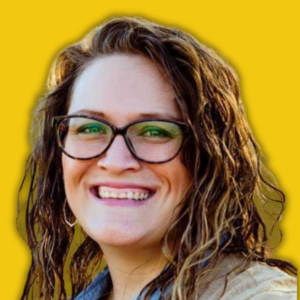 Kelsey Beggs, MBA, CRHCP
Kelsey Beggs, MBA, CRHCP Clinic Administrator
Sudan Medical Clinic
Sudan, Texas
When Kelsey Beggs started as the Clinic Administrator at Sudan Medical Clinic (SMC) in 2021, she was new to Rural Health Clinics but hit the ground running. Her commitment to the Sudan community is evident in her progressive efforts to seek new information and programs to improve the clinic’s services and patient care. Kelsey works tirelessly to ensure this essential clinic in a town of 1,000 continues to thrive.
In the few years since joining SMC, we have renewed our Rural Health Clinic accreditation, earned Patient-Centered Medical Home (PCMH) certifications, joined a new ACO, and taken on many Value-Based Care projects. As a clinic leader, I’ve advocated at the federal level and started working at the state level to get additional PCMH funding. We’ve worked hard to show our communities we are here for the long haul. Through partnerships with the National Association of Rural Health Clinics and other organizations, I ensure the rural voice is heard at events and in conversations with policymakers.
I have been lucky to connect with many local, state and national partners to raise awareness of rural healthcare issues and advocate for policy changes. I find hope and success in highlighting critical issues and presenting solutions our clinic has found that can be used on a broader scale.
Post-COVID, we participated in two vaccine confidence grants, providing vaccine education through social media and community events. These efforts allowed community members to learn more about vaccines, leading to more awareness in the community.
Though I earned my MBA, my interest in health care never faded. My position at SMC brought my knowledge and passion together for a new career. Growing up in a rural town, it was often frustrating that everyone knew each other; however, I knew the community cared. Now that I am older, giving back in a small way to a community that grew and shaped me has been very rewarding.
Sometimes, when people think ‘rural,’ they think of those old Western movies where tumbleweeds roll down dirt roads, but we are so much more than that. Rural people are not afraid of a new problem; they will find a solution or a workaround. Rural people are kind and always ready to lend a helping hand. So, the ‘Power of Rural’ is kindness, preparedness, fearlessness, and resourcefulness, but also so much more that is hard to capture in words.
The Texas State Office of Rural Health has been so beneficial not only to my professional development but also to the growth of the clinic. SMC would not have been as successful or knowledgeable without their assistance.
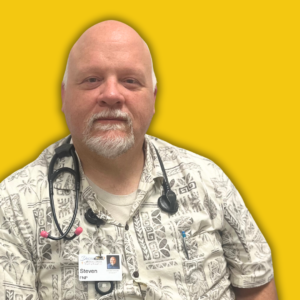 Steven Barlow
Steven BarlowFamily Nurse Practitioner
Dakota Regional Medical Center
Cooperstown, North Dakota
Steven Barlow has served Griggs County residents for over eight years. Whether working in the emergency room clinic or nursing home, his dedication to his practice and patients is evident. Known for going the extra mile, he regularly travels over 40 miles to a satellite clinic and nursing home, stays late, and always offers a helping hand. Steven ensures his patients receive timely, professional care and is always available to answer their questions, even after hours. He even organizes staff activities to ensure his colleagues know how much their efforts are appreciated. Steven is committed to Dakota Regional Medical Center and the advancement of rural health, setting an example for the next generation of healthcare workers.
As part of a small medical team of three full-time nurse practitioners and a medical director, I do a bit of everything. We constantly assess the community’s needs and find ways to respond. Whether discussing bullying at the school or starting a new dialysis program, we always strive to expand how we serve.
It is a blessing to be able to do this every day. I particularly enjoy working with nurse practitioner students and watching their excitement for working in rural health grow.
We are eagerly awaiting the launch of our dialysis program. We also recently started cardiac and pulmonary rehab programs. I love helping people get care close to home.
We’ve been incredibly fortunate to collaborate with our local tertiary care facilities, which are always available and ready to answer questions. Additionally, we utilize a telehealth emergency medicine service. These partnerships help us balance providing safe, high-quality care in our small rural facility and coordinating transfers to more resource-rich settings when necessary. I cannot thank them enough for their professionalism and genuine interest in the well-being of our patients.
To me, health care is about relationships. There is no better place than a small community for me to develop meaningful and therapeutic relationships with those I serve.
Rural folks are, by nature and circumstance, problem solvers. They embody the idea of doing less with more. I am constantly amazed at my colleagues’ willingness and flexibility to find creative solutions to provide high-quality solutions to meet our customers’ needs.
The North Dakota Center for Rural Health staff are phenomenal folks and fully committed to the promotion of rural health.
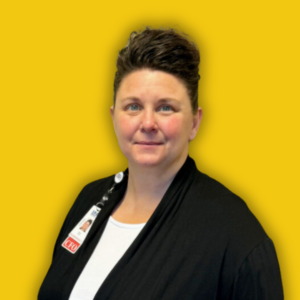 Kena Allen
Kena AllenCFO
McCurtain Memorial Hospital
Idabel, Oklahoma
Kena Allen has served in multiple roles at McCurtain Memorial Hospital, a Critical Access Hospital in the southeast corner of Oklahoma. She has provided steady leadership through numerous transitions. Her deep engagement and unwavering commitment reflect her strong desire to see the facility succeed.
Our mission is to provide necessary health care to all residents in our community, especially those with no other means to access services. We serve an impoverished area where many cannot afford to travel for care, so it’s crucial for our hospital and Rural Health Clinics to be a resource for all. It’s not just about money or the bottom line; it’s about being there for people in their greatest times of need, day in and day out.
In a rural setting, we wear many hats and do whatever it takes to accomplish the mission. It’s about not just saying we care, but showing we care. We do this by engaging with our community by hosting and participating in events.
One of the most rewarding experiences is keeping our doors open despite significant challenges. These obstacles have made our team stronger and more resilient – the best is yet to come.
I am proud to work for an organization that wants to not only provide health care services but to be a resource to other community agencies. We partner with our local Child Welfare Office and provide bags of clothing, hygiene items and even toys to children who have been removed from unimaginable circumstances. Through our Wellness and Rehab Center, our showering and bathing facilities are open 24/7 to them. It is our privilege to try to be a blessing to these children and the Child Welfare staff dealing with these issues.
The “Power of Rural” is about communities coming together for a common purpose, united in their mindset and willing to be a voice for their community’s needs. It’s about building up one another, thinking outside the box and overcoming any sense of feeling too small to make a difference. Together, we can do anything!
Our State Office of Rural Health is exemplary. They are a resource for us that leads to more resources. They continuously share insightful data and information and assist in networking us with other rural Hospitals within our state and region. We have enjoyed many years of working with our State Rural Health Office and look forward to many more.
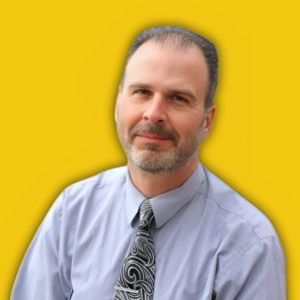 Michael Baker
Michael BakerHealth Services Director
Jefferson County Public Health
Madras, Oregon
Dr. Baker truly embodies the spirit of a Community Star. He tirelessly advocates for equality among Oregon’s rural local public health and healthcare organizations, efforts that significantly contribute to better health outcomes in our rural communities. He has forged strong partnerships, both statewide and within his county, to improve the health of the most underserved. His leadership and steadfast commitment to making a positive difference are awe-inspiring.
My role and the roles of everyone in Jefferson County Public Health (JCPH) are so intertwined it is nearly impossible to separate the work. As the Health Services Director, I collaborate with every program and advocate for staff and the services we provide. JCPH has been involved with everything from homelessness to housing, successful early pregnancies to WIC, supporting new babies with our Infant@Work and Sippy Cuppers programs, and developing policies to help create a healthier community. Locally, there is an ongoing joke that whenever two or more groups gather, JCPH will be there. As a region, social drivers of health are a priority. These are also the programs and approaches to health that public health has prioritized locally for decades. As more partners and organizations enter this work, JCPH is honored to help focus on how this work happens locally.
After 20 years in rural public health, the most rewarding part of my work has always been collaborating with dedicated staff who care deeply about their community. It is absolutely energizing to work with a group of people who want to be there and are committed to doing their best to make life better for everyone. It is impossible to have a bad day at work when everyone is so motivated to make positive change.
I was inspired to pursue a career in rural health because I live in a rural community and can see the barriers and opportunities firsthand. Selfishly, I want to stay in rural, so I work to ensure that there are more opportunities than barriers to living a long and healthy life.
The “Power of Rural” comes from its connections – our health care, schools, businesses, and local governments working directly together every day. These existing relationships make it easier to come together with our daily work, during an emergency, or during times of need.
JCPH is excited to work with the Oregon Office of Rural Health on the Rural Population Health Program, which will help us explore new and innovative ways of addressing health disparities in rural communities.
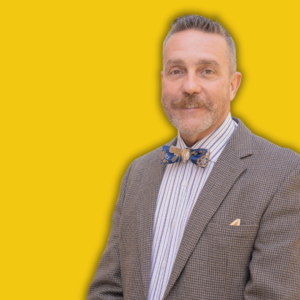 George Garrow, MD
George Garrow, MDChief Executive Officer
Primary Health Network
Sharon, Pennsylvania
Dr. George Garrow is a beacon of dedication and leadership in rural health. His strategic use of resources and innovative approaches have enhanced healthcare accessibility and significantly improved outcomes in underserved areas. Through collaborations with key state and community organizations, Dr. Garrow has been instrumental in developing programs tailored to rural health challenges. His partnership with the Pennsylvania Area Health Education Center to recruit primary care providers and his collaboration with the Penn State College of Medicine to provide training experiences for medical students in rural settings ensures the future of quality health care. His leadership, advocacy, and collaborative spirit have inspired countless individuals to pursue excellence in rural health and have undoubtedly made a lasting difference in the lives of Pennsylvania’s rural residents.
I joined Primary Health Network, a Federally Qualified Health Center, in 2016 as Chief Medical Officer and was proud to help address the healthcare needs of our rural communities. I am incredibly honored to now serve as the CEO. When asked to serve as CEO, I made a commitment to meet with every employee and visit every community served by our Network to get to know them better and listen to their perspectives and concerns.
It is rewarding to see patients and their families out and about in the community. They come up to me to share their experiences in health care, and I’m humbled by their trust.
During the pandemic, we realized that some members of our community were disconnected and unable to access vital care services, including the COVID-19 vaccine. We committed to ensuring that our services were accessible, adaptable, and acceptable throughout the community. I personally made home visits to administer vaccines to homebound individuals who otherwise would not have been able to receive care.
Along with our community’s health foundation, the Buhl Regional Health Foundation, the leaders of our county’s health systems and hospitals convened a County Health Task Force to think creatively about health and health outcomes and to collaborate on ways to address social drivers of health.
I was born and raised in a rural community. My parents instilled in me the importance of service, particularly to neighbors who may not have had access to the same resources we had. They taught me lessons in humility, gratitude and respect for everyone.
We are honored to work closely with the Pennsylvania Office of Rural Health to learn and collaborate as we better understand and address the needs of the communities we are honored to serve.
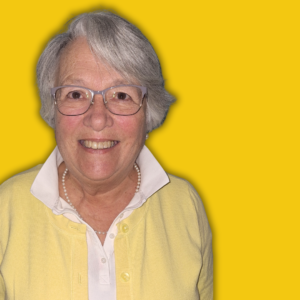 Andréa Martin
Andréa Martin Secretary/Retired educator
Washington County Coalition for Children
Carolina, Rhode Island
As a long-time volunteer with the Washington County Coalition for Children (WCCC), Andrea Martin has been a passionate advocate for the well-being of children in rural Washington County. She leads the children’s book list initiative, carefully reviewing and recommending books on important topics such as bullying prevention, cultural diversity, and children’s mental health for local schools and public libraries. Andrea has also dedicated countless hours to improving children’s mental health across rural Rhode Island, making a lasting impact on the community.
My involvement with WCCC, a regional child advocacy organization in rural Southern Rhode Island, began in 2003 when I was a consultant for the state’s Child Care Support Network and was invited to serve on the Children’s Mental Health Advisory Board. Since then, I’ve overseen various subcommittees and special projects and now contribute as a Board member. WCCC’s 20+ year legacy is built on advocacy, collaboration, and innovation. Our mission is to be a voice for the health and well-being of children and families by creating a culture where all children in Washington County can thrive. We convene multi-sector stakeholders and community members, including youth, to identify needs and engage in collaborative problem-solving to improve outcomes. Even after retiring, I remain dedicated to the Coalition’s mission as a volunteer.
Like most rural areas, our region struggles with limited resources. The affluence in some shoreline areas of our county often means we miss out on state programs and funding, so we’ve had to create and fund our own solutions. As a former special educator, I’m particularly proud of our work on bullying prevention best practices. I strongly believe in the magic of storytelling and books in teaching lessons to children and have enjoyed leading our Feelin’ Groovy emotional literacy art project with local schools and libraries. Partnering with children’s mental health clinicians, educators, librarians, book clubs, university interns, and many others has allowed us to create innovative resources that reflect best practices across disciplines while meeting the needs of our community.
When the state launched its quality rating system for childcare providers (BrightStars), only one provider from Washington County participated. I helped organize local workshops and mentoring sessions to encourage more providers to undergo quality rating assessments and adopt changes to how they care for children. As a result, it’s now the norm for local providers to be involved, improving the quality of childcare in our region.
People and organizations in rural areas thrive because of a sense of independence and tenacity. They don’t wait for solutions to come to them but rather figure out their own solutions. They understand challenges and are eager to help their neighbors. The Power of Rural is People Power!
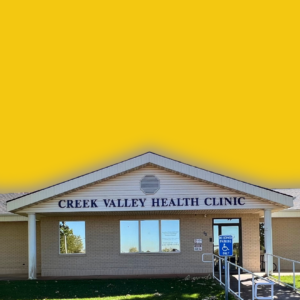 Creek Valley Health Clinic
Creek Valley Health Clinic Serving Hilldale, Utah & Colorado City, Arizona
Creek Valley Health Clinic, a Federally Qualified Health Center, serves the twin cities of Hilldale, Utah, and Colorado City, Arizona. Given the unique background of these cities, they are best thought of as one community rather than two separate cities in different states. The clinic operates in an area with one of the highest poverty rates in the state. Before the clinic opened in 2019, there was no access to local medical and dental services. Beyond providing integrated health services, Creek Valley also supports patients as they navigate referred specialist services, apply for health insurance, and improve their health through community resources.
Creek Valley Health Clinic strives to create a supportive and inclusive environment where everyone can access care, regardless of their ability to pay. Creek Valley engages with the community through outreach, education, and partnerships with local organizations. Its integrated care model includes primary medical care, chronic disease management, mental health services, and dental services, all under one roof. Creek Valley prioritizes health equity and patient-centered care and strives to support patients improve their health and wellness.
A rewarding moment for us was expanding our facility and increasing our capacity to provide integrated medical, behavioral, and dental services. Seeing the new facility coming to life has been incredibly fulfilling. This expanded space will allow us to serve more patients, reduce wait times, and offer an expanded range of services. Witnessing the positive impact on health outcomes thus far reinforces our commitment to providing comprehensive, locally accessible healthcare in our community.
To address limited access to behavioral health, Creek Valley integrates these services into our primary care practice. This involved training staff, establishing communication channels, and utilizing technology for remote consultations and follow-ups. Within the first year of providing integrated care, Creek Valley experienced a significant increase in patients receiving behavioral health services, with improved mental health outcomes, physical health outcomes, patient satisfaction, reduced stigma, and enhanced care coordination. Recently, Creek Valley has integrated dental hygiene services into primary care, focusing on improving oral health outcomes through this evidence-based model.
Creek Valley has conducted numerous school visits, providing health education on a variety of topics. It has also led school-based sports programs, including the creation of an adolescent mountain biking team and supporting a local youth basketball league. These community partnerships impact health “outside of the exam room” and have fostered a healthier, more supportive environment for students and families living in the community.
We’ve been honored to receive the Utah Primary Care Grant for the past five years. This grant, facilitated through our strong partnership with the State Office of Rural Health, has been instrumental in expanding our reach and ensuring access to quality healthcare for all, regardless of their insurance status.
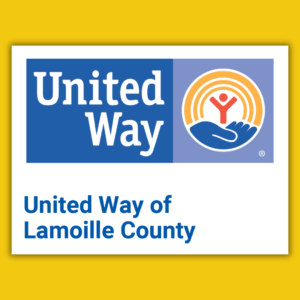 United Way of Lamoille County
United Way of Lamoille County United Way of Lamoille County (UWLC) fosters collective action to address complex challenges in the community by linking partners with resources, mobilizing support, and advocating for equitable access to services. With funding from the CDC, UWLC expanded its capacity to assist rural residents experiencing homelessness and those from historically marginalized or underserved groups. They’ve improved access to technology, enabling community members to connect with essential services like employment, housing, food access, and transportation. UWLC also was a FEMA-endorsed hub for flood recovery efforts across the county in 2023 and 2024, establishing a diverse board to assist those impacted by the flooding. UWLC truly embodies the “Power of Rural.”
At UWLC, our mission is to harness community assets to improve the overall well-being of Lamoille County. We bring together organizations, the faith community, businesses, and residents to leverage their collective talents and ideas. By connecting community partners with the tools they need, we ensure equitable access to high-quality services.
Our care systems are often complex and challenging to navigate, so we created a Mobile Rural Resource Navigator (MRRN) position. The MRRN provides an expert-level understanding of those systems to people trying to navigate them – and in an easily accessible location. In 2023, our MRRN supported more than 880 people in accessing services and support.
At the onset of the pandemic, recognizing that many were struggling to access essential resources, we created a localized resource page to offer a quick and easy list of available resources for our community. Thanks to the support of dedicated volunteers and community organizations, we expanded the page and enhanced outreach efforts. We also launched a weekly newsletter, reaching over 600 recipients, to highlight specific resources and initiatives, including a public health campaign to get residents vaccinated for COVID-19. Following that period, Lamoille County achieved one of the highest vaccination rates in the state.
In 2020, UWLC was invited to participate in a grant project to strengthen local economies. This collaborative effort, involving over 20 local organizations and businesses, addressed equity, housing, transportation, and substance use issues. This collaboration has significantly impacted our community, with key accomplishments including the implementation of Recovery Friendly Workplaces and the creation of the Lamoille Equity Team.
The “Power of Rural” is the connection between community members, the beauty of the landscape, and the ability to address large systemic problems using creativity and ingenuity. Rural communities are an incredible testing ground for solutions to issues that we all face. Relationships are critical to survival and success – when organizations collaborate, they can be hugely successful.
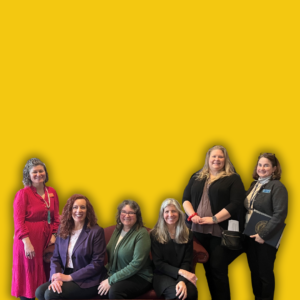 New Hampshire Health Care Workforce Coalition
New Hampshire Health Care Workforce Coalition The New Hampshire Health Care Workforce Coalition, consisting of over 80 healthcare providers, business organizations, and advocacy groups, meets regularly to address key challenges affecting healthcare access across the state. The Coalition has focused on policy solutions that have led to significant investments in New Hampshire’s healthcare system, particularly benefiting rural areas.
The New Hampshire Health Care Workforce Coalition came together in 2018 to address systemic healthcare workforce shortages that led to delays in accessing care. Through our advocacy, we helped secure historic Medicaid rate increases, bringing more than $130 million in additional federal funding to the state. In addition, we successfully secured $6.5 million for the State Loan Repayment Program, greatly enhancing our ability to recruit and retain qualified clinicians in rural areas. We also successfully advocated for expanding the types of providers who can utilize and be reimbursed for telehealth services, which has been essential in expanding access to critical healthcare services in rural areas. Moreover, we helped establish the Health Professions Data Center, which collects healthcare workforce data to identify gaps in provider supply. Ultimately, we believe that better access to quality primary and preventive care improves every life, and we will continue our work in a bipartisan fashion to meet the health needs of the populations we serve.
Community Health Workers (CHW) are a critical component of the integrated healthcare teams serving rural New Hampshire. Our Coalition has been instrumental in supporting CHWs through our advocacy efforts, leading to the creation of a voluntary certification program that allows CHWs to receive Medicaid reimbursement for their work. Listening to them testify about the vital work they do and the impact their work has on the state has been rewarding.
Prior to our Coalition’s formation, healthcare organizations advocated as individuals for change. Our Coalition really brought people together—our motto was “rising tides lift all boats,” and we’ve worked together for six years to effect change. We were successful because we worked together to improve the lives of Granite Staters.
The “Power of Rural” means working together across great geographic distances, with providers across the continuum of care and stakeholders, to ensure people in rural New Hampshire have access to the services they need when they need them.
We partner with our SORH on a regular basis to ensure greater access to healthcare services. We review data, trends, needs, and outcomes to ensure state policies increase access when and where necessary.
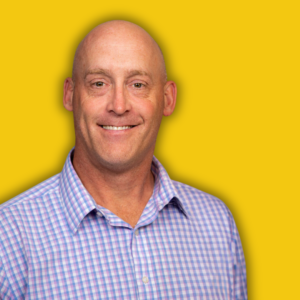 Brock Rops
Brock Rops Executive Director
South Dakota HOSA-Future Health Professionals
Sioux Falls, South Dakota
Brock Rops has been a long-time champion of healthcare career exploration and excellence for young people in South Dakota. As the Executive Director of South Dakota HOSA (Health Occupations Students of America) and Deputy Director of the South Dakota Area Health Education Center (AHEC), he brings unmatched energy to every event. Brock personally impacts all HOSA students, guiding them through the program and into academia and the healthcare workforce as confident, well-prepared professionals. His ability to inspire students supports a healthy and strong South Dakota and drives the “Power of Rural” forward.
As Executive Director of South Dakota HOSA-Future Health Professionals, I help shape the vision and implement resources, programming, and conferences for our student membership. I lead efforts to expand and engage the program with interested school districts across the state. We aim to nurture students in rural and frontier communities who are interested in pursuing healthcare careers. By offering engaging resources, we build their confidence and help “build a better” candidate for our future healthcare pipeline.
After teaching high school for 11 years, helping students succeed remains a passion of mine. The greatest reward is watching students pursue a calling in health care and then witnessing their goals come to fruition. It’s awesome! What really gives me chills is the reflection of their time in the program and the impact it had on their success.
We are currently developing a virtual HOSA program for students in some of the most rural and remote counties in South Dakota. Through technology, we aim to provide resources and opportunities to students with limited options. This virtual option offers online modules and quarterly Zoom calls to keep students engaged and connected.
Over the past three years, South Dakota HOSA chapters have partnered with the American Blood Centers to host blood drives in their communities. So far, five communities have participated, resulting in over 250 donors and hundreds of units of blood donated – a significant impact.
While not on the radar early in my career, it has become a passion of mine to help build confidence in these students, especially in rural communities. My hope is that they better understand the opportunities in their own backyard and have the chance to work and raise a family there.
The “Power of Rural” is a multifaceted engine that embodies economic prowess, altruistic relationships, resilience, and sustainability of all involved. Neighbors, shoulder to shoulder, overcoming any obstacle as a power of “we” and not “me.”